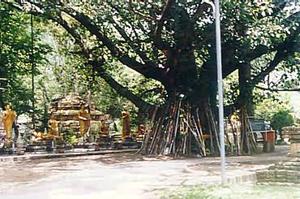
Window to Chiang Mai Thailand

Window to Chiang Mai Thailand
Elephant Care & Trekking Tours
 Buddhism is based on the teachings of one Siddhartha Gautama who lived in North India in the 6th century BC. Born to the ruler of the Kingdom of the Sakyas (in modern Southern Nepal) his early life was as a prince. However, when confronted with the reality of life beyond the palace walls, he left at the age of 29 to begin the life of an ascetic in search of a solution to the suffering of mankind.
Buddhism is based on the teachings of one Siddhartha Gautama who lived in North India in the 6th century BC. Born to the ruler of the Kingdom of the Sakyas (in modern Southern Nepal) his early life was as a prince. However, when confronted with the reality of life beyond the palace walls, he left at the age of 29 to begin the life of an ascetic in search of a solution to the suffering of mankind.
After studying many disciplines he achieved enlightenment under a Bhodi tree (ficus religiosis) at the age of 35. Until his death at the age of 80, the Buddha taught the four noble truths to all who were ready to understand, regardless of caste or creed.
The first noble truth states that all existence is in a constant state of change. We are born, we become old, we get sick and we die. We are nothing more than a collection of physical and mental forces momentarily bound together as a human being. This condition he described as human suffering - as dukkha. We mistakenly attach a sense of self, of personal identity, to this flow of change and constantly create desires which we try to satisfy all our lives.
 The second noble truth is that this fundamental craving, this continuous round of desires, is the cause of dukkha.
The second noble truth is that this fundamental craving, this continuous round of desires, is the cause of dukkha.
The third noble truth states that if the mistaken views that give rise to dukkha. cease, then nirvana - a peace that passeth all understanding and totally beyond words to describe - is revealed.
The final truth teaches that there is a way to bring dukkha to an end within a human being. This involves following a way of life that is right in terms of the goal - the end of suffering.
Known as "The Noble Eight-fold Path", the path provides explicit instruction for behavior in eight aspects of human life. These must be pursued simultaneously.
Right understanding and right thought provide a foundation for wisdom; right speech, right action and right livelihood provide a code of morality; right effort, right mindfulness and right concentration provide a practice of mental discipline.
The Buddha claimed that he was nothing more than a human being and that the ability to become a Buddha was possible for all humans. The Buddha stressed that this can only be achieved through the personal effort and intelligence of an individual following the path.
The saffron-robed community of monks - the sangha - are, ideally, trying to live a life that follows and supports others on this path. The general people make merit by supporting the sangha and thereby encourage the virtue of selflessness through generosity.